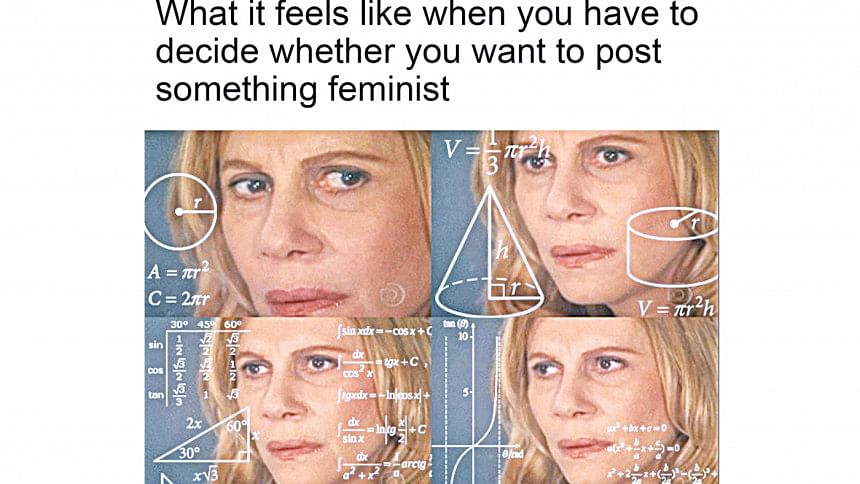The stages of deciding to post feminist opinions

As I scrolled through my newsfeed to find a poem called "Yet Another Rape Poem" by Blythe Baird, I decided to click on it. By the end of the poem, I realised that despite what the title might say, it is not just another piece of unrecognised art that you forget, it is the kind that you share and talk about. But within a millisecond of having this thought, my little brain went through the most complex cost benefit analysis women go through every time they want to talk about their rights, their tragedies, their struggles.
To understand the depth of my insecurity, I went ahead to talk to a few women and realised that the complex decision between choosing to press the share button or not to press the share button happens in a few stages.
Stage 1: Frequency Determination
There seems to be a maximum number of posts that one can share in a month that is pro-feminist. You can't be advocating for your rights every other day or every couple of hours. That might not send the right message. People might think you're "too outspoken", or worse, "just a feminist" and nothing else. And that's obviously bad because who wants to be reduced to just someone who advocates for basic equality?
So, count how many posts you shared that day. How many did you post that month. Jumanah Ahmed, a sophomore at University of Waterloo, says, "It is an irrational fear, but a fear nonetheless, that somehow I will be taken less seriously or be considered annoying if my feminist posts are too frequent."
Stage 2: Depth analysis
After assuring that the maximum frequency has not been reached for that particular day, we move on to weighing out how heavy this content is. While struggles that women face cannot be quantified to decide which trauma is more important, society has made sure we understand that certain highly sensitive topics like sexual assault is not to be discussed too openly because it brings the highest level of shame.
When asked about what she feels about this, Mishi Chowdhury, a junior at London College of Legal Studies, says, "Every time I want to post something related to sexual assault I wonder if people will think that this happened to me and then victim blame me or worse, treat me as someone around whom one can't discuss sexual topics without them being offended."
Stage 3: Pre-emptive humour addition
This seemed like the most interesting stage. Snigdha Khan* who is a final year student in a public university in Dhaka, shares, "Sometimes when I am unsure of how my advocacy will be perceived, I willingly put something humorous or ironic in the caption just to make sure that I can later say that it was a joke. It isn't that I don't feel deeply about women and their struggles, it's just that I get scared at times that maybe I will be laughed at or labelled as feminazi."
Stage 4: Testing strength of support group
Even with three levels of filtering, there needs to be a "what if" analysis. "What if I still get backlash, will I have support?"
Maliha Noshin Khan, a senior student, wonders, "I fear that instead of supporting me, society will remain silent or worse, I will be told that I should make my own practices perfect and socially acceptable before commenting about important issues in society."

Stage 5: Decision time
When it comes to deciding if our voices have successfully passed the filter test of society or if it still needs to be hidden away in some corner of our minds, some of us end up pressing "Enter" while others opt for repeatedly hitting the "Backspace" button. Abort mission.
While it is perfectly possible for women to go through these stages in different orders, or not go through them at all, the fact that women have to think more than twice while asking for what is rightfully theirs, cannot be denied. So, what must we do?
Subah Ali of University of Asia Pacific shares how she processes all of this. "I remind myself how irrelevant all of society's sexist concerns are and the fight for women's rights is a very real thing. This is exactly what the patriarchal system wants – to make us feel apprehensive. We must not let them win," she says.
Press "Enter".
*Name has been changed for privacy.
Megha often hits enter. Send her doggo memes at [email protected]

 For all latest news, follow The Daily Star's Google News channel.
For all latest news, follow The Daily Star's Google News channel. 



Comments